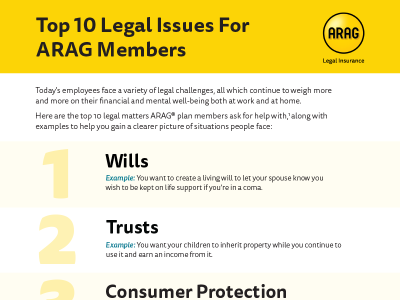Working with an attorney can be overwhelming — but it doesn’t have to be! We asked some of our network attorneys to share what clients can do to make the process easier and less stressful for both of you. Use these tips to prepare before you talk or meet with your network attorney.
1. Do your homework.
Your attorney is going to have quite a few questions for you — and, depending on the legal matter, will want any required documentation. For example, if you’re dealing with a child support issue, you’ll want to come with a timeline of when (and how frequently) payments were missed.
You’ll also want to provide your attorney a copy of the child support agreement, divorce decree or any other legal documents that impact the matter. That gives your attorney context and also provides information like a case number, judge and opposing counsel — all of which is beneficial for your attorney to know.
2. Share your legal history.
If you’ve met or worked with other attorneys in the past, discuss that with your new attorney. Talk about what went well and what didn’t. If you feel your attorney didn’t represent you well or communicate with you, that’s important for your new attorney to know — it can help set your client-attorney relationship on the path to success.
3. Tell the truth, the whole truth and nothing but the truth.
Depending on your legal matter, the situation you’re in may be emotional or even embarrassing. Attorneys understand this — they deal with these situations every day as part of their job. Keep in mind that although some things may be difficult to talk about, the more you share with your attorneys the better.
If you don’t tell them the entire story or change events to put yourself in a better light, you could be jeopardizing your chances in the case. The truth generally comes out in the end, and better for your attorney to hear from you than to be surprised in the middle of the case.
4. Understand things will take time.
The more complicated your legal issue, the more time it may take to reach a resolution. Even a situation that may seem straightforward can take longer than you (and your attorney) expect due to circumstances outside of your attorney’s control, such as a judge’s backed-up case load or a slow-moving defense attorney that hasn’t provided your attorney necessary documentation.
Ask your attorney to provide you a best-case timeline for your case but also talk about what could go wrong and what could take additional time. Then remember that communication is key as you go through the process ― have your attorney keep you in the loop on what is happening, including any roadblocks or setbacks that may occur.
Need help finding an attorney or have questions about your legal issue? Reach out to an ARAG customer care specialist at 800-247-4184, Monday through Friday, 7 a.m. to 7 p.m. Central time.



